| Listing 1 - 9 of 9 |
Sort by
|

ISBN: 0415411610 0415411602 9780415411615 9780415411608 9780203944851 9781134128099 9781134128136 9781134128143 Year: 2007 Publisher: London Routledge
Abstract | Keywords | Export | Availability | Bookmark
 Loading...
Loading...Choose an application
- Reference Manager
- EndNote
- RefWorks (Direct export to RefWorks)
856 Conflictbenadering --- Ethnic conflict --- Peace-building --- Conflict, Ethnic --- Ethnic violence --- Inter-ethnic conflict --- Interethnic conflict --- Ethnic relations --- Social conflict --- Building peace --- Peacebuilding --- Conflict management --- Peace --- Peacekeeping forces
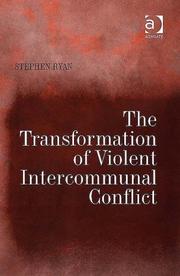
ISBN: 9780754642640 9780754642640 075464264X 9781315552064 9781317013495 9781317013501 Year: 2007 Publisher: Aldershot Ashgate
Abstract | Keywords | Export | Availability | Bookmark
 Loading...
Loading...Choose an application
- Reference Manager
- EndNote
- RefWorks (Direct export to RefWorks)
Ethnic conflict --- Violence --- Conflict management. --- International relations. --- Conflits ethniques --- Gestion des conflits --- Relations internationales --- Prevention. --- Prévention --- Conflict management --- Peace-building --- 856 Conflictbenadering --- Building peace --- Peacebuilding --- Peace --- Peacekeeping forces --- Conflict, Ethnic --- Ethnic violence --- Inter-ethnic conflict --- Interethnic conflict --- Ethnic relations --- Social conflict --- Conflict control --- Conflict resolution --- Dispute settlement --- Management of conflict --- Managing conflict --- Management --- Negotiation --- Problem solving --- Crisis management --- Prevention
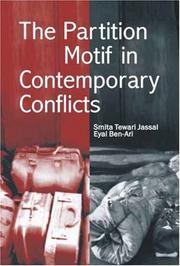
ISBN: 1282004476 9786612004476 8132101111 9788132101116 9780761935476 0761935479 9352800427 Year: 2007 Publisher: New Delhi Thousand Oaks Sage Publications
Abstract | Keywords | Export | Availability | Bookmark
 Loading...
Loading...Choose an application
- Reference Manager
- EndNote
- RefWorks (Direct export to RefWorks)
This important book is a dialogue on the theme of partition and its far-reaching. sociological implications for communal patterns, generational dynamics and individual. lives. While the governing imagery of partition is drawn from the context of India. and Pakistan, the analysis compares similar processes in the context of Israel. and Palestine and East and West Germany. Developing the concept of 'partition-societies',. the volume succinctly explains the social, economic and political implications. of such divisions. The lens of partition is used to focus on how societies that have experienced
Partition, Territorial. --- Political violence. --- Ethnic conflict. --- Nationalism. --- Consciousness, National --- Identity, National --- National consciousness --- National identity --- International relations --- Patriotism --- Political science --- Autonomy and independence movements --- Internationalism --- Political messianism --- Conflict, Ethnic --- Ethnic violence --- Inter-ethnic conflict --- Interethnic conflict --- Ethnic relations --- Social conflict --- Violence --- Political crimes and offenses --- Terrorism --- Divided states --- Partitioned states --- States, Divided --- States, Partitioned --- Territorial partition --- Administrative and political divisions --- Dismemberment of nations
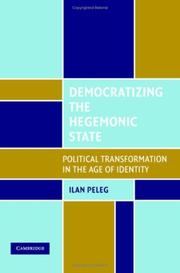
ISBN: 9780521880886 9780521707329 9780511611254 9780511350207 0511350201 9780511348372 0511348371 0521880882 0511611250 0521707323 1107184630 1281086274 9786611086275 0511351100 0511349343 0511574142 9781107184633 9781281086273 6611086277 9780511351105 9780511349348 9780511574146 Year: 2007 Publisher: New York, N.Y. Cambridge University Press
Abstract | Keywords | Export | Availability | Bookmark
 Loading...
Loading...Choose an application
- Reference Manager
- EndNote
- RefWorks (Direct export to RefWorks)
This book provides a new, comprehensive analytical framework for the examination of majority-minority relations in deeply divided societies. Hegemonic states in which one ethnic group completely dominates all others will continue to face enormous pressures to transform because they are out of step with the new, emerging, global governing code that emphasizes democracy and equal rights. Refusal to change would lead such states to lose international legitimacy and face increasing civil strife, instability, and violence. Through systematic theoretical analysis and careful empirical study of 14 key cases, Peleg examines the options open to polities with diverse populations. Challenging the conventional wisdom of many liberal democrats, Peleg maintains that the preferred solution for a traditional hegemonic polity is not merely to grant equal rights to individuals, but also to incorporate significant group rights via mega-constitutional transformation.
National movements --- POLITICAL STABILITY -- 323.39 --- CASE STUDIES -- 323.39 --- HEGEMONY -- 323.39 --- Democratization --- Nationalism --- Ethnic conflict --- Hegemony --- Political stability --- Destabilization (Political science) --- Political instability --- Stability, Political --- Consensus (Social sciences) --- Legitimacy of governments --- Hegemonism --- Political science --- Sociology --- Unipolarity (International relations) --- Conflict, Ethnic --- Ethnic violence --- Inter-ethnic conflict --- Interethnic conflict --- Ethnic relations --- Social conflict --- Democratic consolidation --- Democratic transition --- New democracies --- Political aspects --- Social Sciences --- Political Science
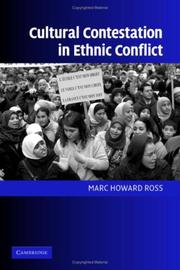
ISBN: 9780521870139 0521870135 9780521690324 0521690323 9780511491115 9780511286216 051128621X 0511285477 9780511285479 0511282273 9780511282270 0511283873 9780511283871 0511284675 9780511284670 0511321074 9780511321078 0511491115 1107171547 1280909439 9786610909438 Year: 2007 Publisher: Cambridge New York Cambridge University Press
Abstract | Keywords | Export | Availability | Bookmark
 Loading...
Loading...Choose an application
- Reference Manager
- EndNote
- RefWorks (Direct export to RefWorks)
Ethnic conflict often focuses on culturally charged symbols and rituals that evoke strong emotions from all sides. Marc Howard Ross examines battles over diverse cultural expressions, including Islamic headscarves in France, parades in Northern Ireland, holy sites in Jerusalem and Confederate flags in the American South to propose a psychocultural framework for understanding ethnic conflict, as well as barriers to, and opportunities for, its mitigation. His analysis explores how culture frames interests, structures demand-making and shapes how opponents can find common ground to produce constructive outcomes to long-term disputes. He focuses on participants' accounts of conflict to identify emotionally significant issues, and the power of cultural expressions to link individuals to larger identities and shape action. Ross shows that, contrary to popular belief, culture does not necessarily exacerbate conflict; rather, the constructed nature of psychocultural narratives can facilitate successful conflict mitigation through the development of more inclusive narratives and identities.
Ethnic conflict. --- Culture conflict. --- Ethnopsychology. --- Conflits ethniques --- Conflit culturel --- Ethnopsychologie --- Cross-cultural psychology --- Ethnic groups --- Ethnic psychology --- Folk-psychology --- Indigenous peoples --- National psychology --- Psychological anthropology --- Psychology, Cross-cultural --- Psychology, Ethnic --- Psychology, National --- Psychology, Racial --- Race psychology --- Psychology --- National characteristics --- Cultural conflict --- Culture wars --- Conflict of cultures --- Intercultural conflict --- Social conflict --- Conflict, Ethnic --- Ethnic violence --- Inter-ethnic conflict --- Interethnic conflict --- Ethnic relations --- Social Sciences --- Political Science

ISBN: 9782845868724 2845868723 Year: 2007 Publisher: Paris Karthala
Abstract | Keywords | Export | Availability | Bookmark
 Loading...
Loading...Choose an application
- Reference Manager
- EndNote
- RefWorks (Direct export to RefWorks)
Civil war --- Ethnic conflict --- Massacres --- Genocide --- Burundi --- Génocide --- Génocide --- Atrocities --- History --- Persecution --- Cleansing, Ethnic --- Ethnic cleansing --- Ethnic purification --- Ethnocide --- Purification, Ethnic --- Crime --- Conflict, Ethnic --- Ethnic violence --- Inter-ethnic conflict --- Interethnic conflict --- Ethnic relations --- Social conflict --- Civil wars --- Intra-state war --- Rebellions --- Government, Resistance to --- International law --- Revolutions --- War --- National movements --- anno 1970-1979 --- Histoire --- Politics and government --- Politique et gouvernement --- Relations interethniques --- Civil war - Burundi --- Ethnic conflict - Burundi --- Massacres - Burundi --- Genocide - Burundi
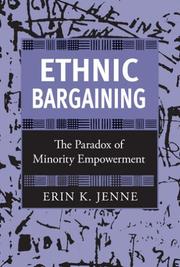
ISBN: 0801479770 0801444985 080147180X 1322523258 9780801444982 0801471796 Year: 2007 Publisher: Ithaca : Cornell University Press,
Abstract | Keywords | Export | Availability | Bookmark
 Loading...
Loading...Choose an application
- Reference Manager
- EndNote
- RefWorks (Direct export to RefWorks)
Ethnic Bargaining introduces a theory of minority politics that blends comparative analysis and field research in the postcommunist countries of East Central Europe with insights from rational choice. Erin K. Jenne finds that claims by ethnic minorities have become more frequent since 1945 even though nation-states have been on the whole more responsive to groups than in earlier periods. Minorities that perceive an increase in their bargaining power will tend to radicalize their demands, she argues, from affirmative action to regional autonomy to secession, in an effort to attract ever greater concessions from the central government.The language of self-determination and minority rights originally adopted by the Great Powers to redraw boundaries after World War I was later used to facilitate the process of decolonization. Jenne believes that in the 1960s various ethnic minorities began to use the same discourse to pressure national governments into transfer payments and power-sharing arrangements. Violence against minorities was actually in some cases fueled by this politicization of ethnic difference.Jenne uses a rationalist theory of bargaining to examine the dynamics of ethnic cleavage in the cases of the Sudeten Germans in interwar Czechoslovakia; Slovaks and Moravians in postcommunist Czechoslovakia; the Hungarians in Romania, Slovakia, and Vojvodina; and the Albanians in Kosovo. Throughout, she challenges the conventional wisdom that partisan intervention is an effective mechanism for protecting minorities and preventing or resolving internal conflict.
Conflits ethniques --- #SBIB:340H85 --- Internationaal recht: bijzondere vraagstukken: minderheden --- Ethnic conflict --- Minorities --- History --- Political activity --- Political activity. --- Europe, Eastern --- Europe, Central --- Ethnic relations --- Minorités --- Histoire --- Activité politique --- Europe de l'Est --- Europe centrale --- Relations interethniques --- #SBIB:328H27 --- #SBIB:340H88 --- Ethnic minorities --- Foreign population --- Minority groups --- Persons --- Assimilation (Sociology) --- Discrimination --- Majorities --- Plebiscite --- Race relations --- Segregation --- Conflict, Ethnic --- Ethnic violence --- Inter-ethnic conflict --- Interethnic conflict --- Social conflict --- Instellingen en beleid: Midden- en Centraal Europa: algemeen --- Internationaal recht: rechten van de mens --- East Europe --- Eastern Europe --- Central Europe
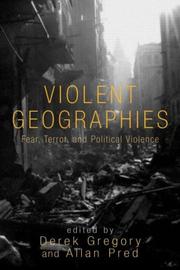
ISBN: 113592905X 1135929068 9786610732104 1280732105 1429459115 0203944585 9781429459112 9780203944585 0415951461 041595147X 9780415951463 9781135929053 9780415951470 9781135929060 9781135929015 Year: 2007 Publisher: New York Routledge
Abstract | Keywords | Export | Availability | Bookmark
 Loading...
Loading...Choose an application
- Reference Manager
- EndNote
- RefWorks (Direct export to RefWorks)
Derek Gregory and Allan Pred's Violent Geographies gathers together a group of young and well established geographers to look at how territory and space delimit and shape both terrorism and political violence in wide range of places, from the Middle East to Latin America. In short, the book shows how physical violence, especially terrorism, disrupts the distinction between the global and the local by injecting transnational politics into the intimacies of everyday life. Violent Geographies also shows how terrorism is not simply used by nonstate groups --states use it as well, including many of
Political violence. --- Ethnic conflict. --- Terrorism. --- War on Terrorism, 2001-2009. --- Global Struggle Against Violent Extremism, 2001-2009 --- Global War on Terror, 2001-2009 --- GWOT, 2001-2009 (War on Terrorism) --- Terror War, 2001-2009 --- Terrorism War, 2001-2009 --- War against Terrorism, 2001-2009 --- War on Terror, 2001-2009 --- Military history, Modern --- Terrorism --- World politics --- Afghan War, 2001 --- -Iraq War, 2003-2011 --- Operation Enduring Freedom, 2001 --- -Acts of terrorism --- Attacks, Terrorist --- Global terrorism --- International terrorism --- Political terrorism --- Terror attacks --- Terrorist acts --- Terrorist attacks --- World terrorism --- Direct action --- Insurgency --- Political crimes and offenses --- Subversive activities --- Political violence --- Terror --- Conflict, Ethnic --- Ethnic violence --- Inter-ethnic conflict --- Interethnic conflict --- Ethnic relations --- Social conflict --- Violence --- Prevention --- War on Terrorism, 2001-. --- Afghan War, 2001-2021 --- Iraq War, 2003-2011
Book
ISBN: 995280914X 9789952809145 Year: 2007 Publisher: Baky Ministry of Foreign Affairs of the Republic of Azerbaijan
Abstract | Keywords | Export | Availability | Bookmark
 Loading...
Loading...Choose an application
- Reference Manager
- EndNote
- RefWorks (Direct export to RefWorks)
Cultural property --- Lost architecture --- Monuments --- Ethnic conflict --- Libraries --- Biens culturels --- Monuments disparus --- Conflits ethniques --- Bibliothèques --- Destruction and pillage --- Destruction et pillage --- Nagorno-Karabakh (Azerbaijan) --- Azerbaijan --- Armenia (Republic) --- Nagorno-Karabakh (Azerbaïdjan) --- Azerbaïdjan --- Arménie --- Relations --- Documentation --- Public institutions --- Librarians --- Conflict, Ethnic --- Ethnic violence --- Inter-ethnic conflict --- Interethnic conflict --- Ethnic relations --- Social conflict --- Historical monuments --- Architecture --- Sculpture --- Historic sites --- Memorials --- Public sculpture --- Statues --- Architectural heritage, Lost --- Buildings, Lost --- Demolished architecture --- Demolished buildings --- Destroyed architecture --- Destroyed buildings --- Lost architectural heritage --- Lost buildings --- Cultural heritage --- Cultural patrimony --- Cultural resources --- Heritage property --- National heritage --- National patrimony --- National treasure --- Patrimony, Cultural --- Treasure, National --- Property --- World Heritage areas --- Armenia --- Bibliothèques --- Nagorno-Karabakh (Azerbaïdjan) --- Azerbaïdjan --- Arménie --- Нагорно-Карабах (Azerbaijan) --- Garabagh (Azerbaijan) --- Qarabağ (Azerbaijan) --- Daghlyg Garabagh (Azerbaijan) --- Karabagh (Azerbaijan) --- Mountainous Gharabagh (Azerbaijan) --- Berg-Karabach (Azerbaijan) --- Нагорный Карабах (Azerbaijan) --- Nagornyĭ Karabakh (Azerbaijan) --- Yuxarı Qarabaǧ (Azerbaijan) --- Leṛnayin Gharabagh (Azerbaijan) --- Gharabagh (Azerbaijan) --- Карабах (Azerbaijan) --- Karabakh (Azerbaijan) --- Нагорно-Карабахская Республика (Azerbaijan) --- Nagorno-Karabakhskai︠a︡ Respublika (Azerbaijan) --- Nagorno-Karabakhskai︠a︡ avtonomnai︠a︡ oblastʹ (Azerbaijan S.S.R.) --- Aserbaidschan --- Azărbai̐jan Respublikasy --- Azarbaijchan Respublikasy --- Āz̲arbāyajān --- Azärbaycan --- Azärbaycan Respublikası --- Āz̲arbāyijān --- Āz̲arbāyjān (Republic) --- Azarbayjan Respublikasy --- Azerbaigian --- Azerbaijani Republic --- Republic of Azerbaijan --- Azerbaijan S.S.R. --- Hayasdan --- Hayastan --- Aĭastan --- Haykʻ Metskʻ --- Mets Haykʻ --- Greater Armenia
| Listing 1 - 9 of 9 |
Sort by
|

 Search
Search Feedback
Feedback About UniCat
About UniCat  Help
Help News
News